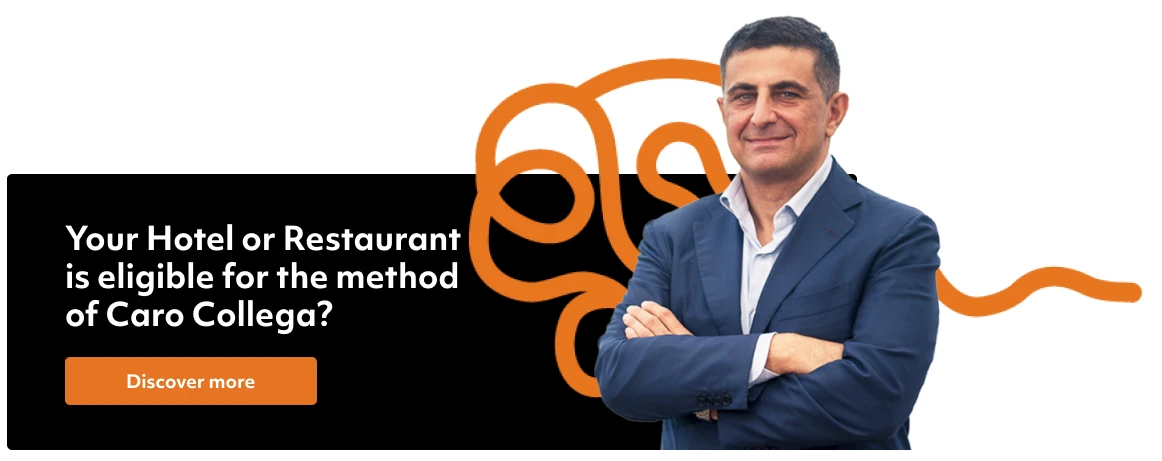Let’s begin with some numbers: a population of 59 million individuals, 78 million smartphone connections, 51 million internet users, and 44 million active social media users. Nearly 6 hours a day are spent on the internet and about 2 hours are spent daily on social media.
These are the figures from the digital report 2023 by “We Are Social/Hootsuite” regarding the Italian situation that I want to reflect on with you.
Because for too many years, I complained that I didn’t have enough customers for my Hotel or Restaurant, but the reality was different:
- I was not looking in the right place.
- I was not adopting the right strategies.
- I was relying on the wrong people.
If you are a hotelier or restaurateur, you can generate additional revenue by intercepting the audience interested in your Hotel or Restaurant found on the Internet and Social Media. Without ifs and buts.
Especially without a choice, since so many fellow Hoteliers and Restaurateurs are doing it and by doing so, they are gaining a competitive advantage that will become increasingly difficult to achieve.
That is why today I am going to talk to you about Copywriting, which is a mix between an art and a science that aims at creating persuasive texts which will lead people to take a specific action such as signing up for a newsletter or visiting a website, or booking a hotel or a table at a restaurant.
I am Giancarlo De Leonardo, former Hotelier and Restaurateur, founder of “Caro Collega”, a Community of enlightened entrepreneurs and managers in the hospitality industry who want to understand how to generate additional revenue through digital strategies and tools.
In this article
- Copywriting for Hotels and Restaurants
- The Importance of Copywriting
- Copywriting, Storytelling and Content Marketing
- The effects of professional copywriting
- Copywriting: some useful tips
- Conclusions
Copywriting for Hotels and Restaurants
Copywriting is an essential element of a marketing or digital marketing strategy since it allows us to intercept the attention of a potential customer through ads, flyers, posters, emails, newsletters, landing pages and other types of promotional content.
A good copywriter must be a careful connoisseur of consumer psychology and must know how to use the necessary language (copywriting) to create effective messages that aim at convincing a user to take the action we desire.
Consequently, to create texts/content (so-called “copy”) that converts, it is necessary to know the audience we wish to reach and to use an appropriate language.
A substantial distinction that needs to be emphasized is between writing traditional persuasive texts or content and texts that will go “online”, which is called SEO copywriting. In this case, the texts/content will have to be written not only to persuade the audience to take a certain ac5on but also in terms of search engine optimization.
Example: if I write a description of my hotel or restaurant for a brochure that I will leave at the hotel reception, I can empathetically write the description I prefer.
On the other hand, if I must write the hotel presentation for the website or Google profile, I will have to take into consideration the keywords that my potential customers are looking for and I will have to make sure that they are repeated several times in the text/content (boutique hotel, hotel & wellness, hotel panorama, etc…).
The Importance of Copywriting
Thus, copywriting is important both when we do traditional (offline) marketing and when we do digital (online) marketing.
- In your digital marketing strategies, copywriting is essential for creating advertisements (ads), sales emails, landing pages, and other types of promotional content. Copywriting helps you create effective messages that might increase your website’s visibility on search engines, increase traffic, and generate contacts (leads).
- In traditional marketing strategies, copywriting is important for creating flyers, brochures, catalogs, and other promotional materials to attract customers and prompt them to action.
Copywriting helps create effective messages that can increase the visibility of your Hotel or Restaurant, increase brand awareness and increase the customers base. For this reason, I recommend that you learn more about it within the Caro Collega community or engage a professional in the field.
Copywriting, Storytelling and Content Marketing
Without dwelling too much on this, because the goal of this article is to give you a smattering on this topic that you can learn more about within the Caro Collega Community, I think it is useful for you to know the difference between:
- Copywriting: it’s the writing of text/content that aims at persuading a potential customer to take the action we want. So, a copywriter can craft the best texts that will help your hotel or restaurant market, advertise, or directly sell. For example: copy for a Facebook post or a Newsletter or your Google ad. Can you or someone else do it for you? Definitely, but how much money do you risk to lose by doing so?
- Storytelling: it’s the use of narratives to communicate a message or idea, creating an emotional connection with the audience. For example, “where there is Barilla there is home” the famous claim from the 1990s that emotionally connected Barilla products and especially pasta to the concept of your own household.
- Content Marketing: it’s a marketing strategy that focuses on the creation and distribution of relevant and valuable content to attract and engage a specific audience, with the goal of generating leads and increasing sales. For example, a recipe video or blog article intended to connect a target audience with our Hotel or Restaurant.
The effects of professional copywriting
Copywriting can have a significant impact on potential customers and your Hotel or Restaurant’s bottom line. Some of the effects we can achieve through professionally done copywriting are:
- Increased conversions: copywriting can increase the conversion rate of visitors into actual customers by increasing the likelihood that potential customers will take the desired action, such as booking a room or table at a restaurant or signing up for a newsletter.
- Increased sales: copywriting can increase sales, as it helps create effective messages that can entice potential customers to spend their money at your business, perhaps by upselling (suite upgrade or a bottle of Champagne) or cross-selling (dinner at a restaurant after you book the room) after the first purchase.
- Increased traffic: copywriting can increase website traffic, as it helps you create effective messages that can increase your website’s visibility on search engines and attract more visitors.
- Increased engagement: copywriting can increase customer engagement, as it helps to create messages that can create an emotional connection with customers and make them more likely to interact with your Hotel or Restaurant. Think of what we can do through social media.
- Improved brand image: copywriting can improve brand image, as it helps create messages that can increase customers’ trust and loyalty to a company.
Copywriting: some useful tips
Now that you have clearer idea about what goals you might achieve through professionally curated copywriting, I’ll leave you with some useful tips that have emerged within the Caro Collega Community.
Whether you are the copywriter in the company, whether it is one of your collaborators or whether it is a freelancer, check that texts/content are constructed with the following in mind:
- Know your target audience. Overhyped and overused, but this advice seems obvious since it is crucial both in reference to copywriting and in marketing in general. A thorough knowledge of the audience allows you to write more specific messages and have more targeted and effective communication. The more “personal” the copy, the greater the engagement (involvement).
-
Brevity and clarity are important allies. “Less is more”. Less words written means fewer words for the user to read. Therefore, greater likelihood that they will all be read and the user will get to the CTA (call to action, i.e., booking).
Basic rule to follow for copywriting: provide useful and clear information.
The attention threshold of users is getting lower and lower. Therefore, it is necessary to write with the thought of having to provide all the necessary (and preparatory information so that in the reader triggers the desire to press on the CTA/call to action) employing as few words as possible. -
You have to write in a simple way. Copywriting produces results when easily understandable terms are used. I, for one, when I write these articles I try to speak “Ospitalese,” the language that all Hoteliers and Restaurateurs understand, the one I would have liked to have heard spoken over the years that I have been a Hotelier and Restaurateur.
You don’t have to write for yourself or to prove you are good but rather to persuade users to take an action or with the intent to be engaging by telling a story. You don’t need words that are too polished or difficult to understand but those that your audience understands best, those that go straight to the heart. -
Create empathy. Put yourself in the shoes of the people we want to intercept. Commit to understanding their doubts, uncertainties and problems and provide possible solutions.
Think about how we can solve a need they have and address them with informal, personalized messages. Imagine having to look your potential customer in the face and personally explain to them what will then be in the copy.
The goal is to establish a trusting relationship with your target audience so that they can always feel like they are the protagonist and the focus of each of your messages. Thus, it will be much easier to guide them to take the desired action. -
Always create value. This is also a 5p (if not a fundamental principle) that applies to marketing in general. Whether it’s the email or a newsletter or a social media post, never forget to provide useful information that will actually help your customers.
There is no point in writing long papers that tell every small detail about the product, without saying how it can help users (the basic principle is the same as the previous advice).
The time spent reading your text must be worth it for your customers, otherwise it becomes wasted not only for them, but also for you.
Conclusions
In conclusion, copywriting can have a significant impact on your prospects and business results by increasing conversions, sales, traffic, engagement, and improving brand image.
As long as you take this activity seriously! Otherwise it would be like putting an amateur to cook in the kitchen and expecting to get Michelin stars.
Article written by Giancarlo De Leonardo, former Hotellier and Restaurateur, founder of Caro Collega.

